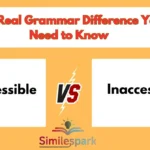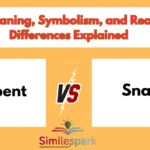Language can be tricky, right? One missing letter can flip an entire meaning. Few examples show this better than “impatient” and “inpatient.”
They sound nearly identical, but they belong to completely different worlds — one emotional, the other medical.
If you’ve ever paused mid-sentence wondering, “Wait, is it ‘impatient’ or ‘inpatient’?” — you’re in the right place.
This guide breaks down everything: meanings, usage, examples, memory tricks, and even a fun rhyme to lock it all in your head.
Let’s dive in.
The Word “Impatient”: When Waiting Isn’t Your Strength
We’ve all felt it — that restless tapping of your foot, glancing at your watch, wishing things would just move faster. That’s impatience in action.
Definition & Part of Speech
Impatient is an adjective describing a person who can’t wait calmly or who gets irritated by delays. It stems from “patient,” meaning able to endure waiting, with the prefix “im–” meaning “not.”
👉 In simple terms: Impatient = not patient.
Example:
“She grew impatient while waiting for her friend to text back.”
Core Meaning and Emotional Tone
Being impatient isn’t just about time — it’s emotional. It reveals eagerness, frustration, or excitement. Sometimes it’s negative (“He’s so impatient with everyone”), but it can also show passion and drive (“She’s impatient for success”).
In short: Impatience can either push you forward or make you snap too soon.
Common Behavioral and Emotional Signs of Impatience
Here are classic signs that someone is feeling impatient:
- Tapping fingers or feet repeatedly.
- Interrupting mid-conversation.
- Checking the clock often.
- Finishing others’ sentences.
- Sighing or rolling eyes during delays.
Case Study Example:
When customer service reps delay responses, users often show impatience by refreshing pages, sending multiple follow-ups, or switching brands. A Harvard Business Review study even found that 90% of customers expect a response in under 10 minutes.
That’s impatience at scale.
Expressions and Idioms Featuring “Impatient”
“Impatient” sneaks into many common phrases. Let’s look at a few:
| Expression | Meaning | Example Sentence |
|---|---|---|
| Grow impatient | Become restless or annoyed | “She grew impatient waiting for her coffee.” |
| Impatient for | Eager for something to happen | “He was impatient for the game to begin.” |
| Impatient with | Frustrated by someone/something | “I’m impatient with slow internet.” |
You’ll notice “impatient” usually pairs with for (when waiting for events) or with (when dealing with people).
Etymology: The Roots of “Impatient”
Here’s a quick origin snapshot:
| Language | Word | Meaning |
|---|---|---|
| Latin | patientem | Enduring, tolerant |
| Prefix | im- | Not |
| Combined | impatientem | Not enduring, restless |
So “impatient” literally means “not able to bear waiting.”
The Word “Inpatient”: When Care Means Staying Inside
Now let’s shift from emotions to medicine. The word “inpatient” is completely different — and it lives in the hospital.
Definition & Grammatical Role
Inpatient functions as both a noun and an adjective.
- As a noun: It refers to a person admitted to a hospital for overnight (or longer) treatment.
- As an adjective: It describes something related to hospital stays.
Examples:
“She was admitted as an inpatient after surgery.”
“The hospital has 200 inpatient beds.”
Meaning in Modern Healthcare
An inpatient is someone who receives care while staying in a medical facility overnight or longer.
Contrast that with an outpatient, who gets treated and goes home the same day.
| Type of Patient | Duration | Example |
|---|---|---|
| Inpatient | Stays at least one night | Surgery recovery, rehabilitation |
| Outpatient | No overnight stay | Checkups, diagnostic tests |
Real-World Examples of “Inpatient” Usage
- “The hospital provides both inpatient and outpatient mental health programs.”
- “After his accident, he spent three weeks as an inpatient at the rehabilitation center.”
- “Insurance covers most inpatient treatment costs.”
Historical & Linguistic Roots
The word comes from combining “in” (meaning within) and “patient” (a person receiving medical care). So “inpatient” literally means “a patient within the hospital.”
Notice how the prefix changes everything:
- im- → means “not” (emotional context)
- in- → means “inside” (location context)
“Impatient” vs “Inpatient”: Spot the Difference
A single letter changes meaning, tone, and even context completely.
Contextual Comparison Table
| Feature | Impatient | Inpatient |
|---|---|---|
| Meaning | Restless or unable to wait | Hospitalized for medical treatment |
| Part of Speech | Adjective | Noun / Adjective |
| Context | Emotional / Behavioral | Medical |
| Prefix Meaning | “Not” | “Inside” |
| Example Sentence | “She’s impatient with slow drivers.” | “He’s an inpatient recovering from surgery.” |
Example Sentences in Direct Contrast
- ❌ Wrong: “He’s an impatient at the clinic.”
- ✅ Correct: “He’s an inpatient at the clinic.”
- ❌ Wrong: “She’s inpatient for the meeting to start.”
- ✅ Correct: “She’s impatient for the meeting to start.”
Notice how one deals with feelings, while the other refers to medical status.
Quick Grammar Tip: One Means Feelings, One Means Healing
Here’s a quick way to remember:
🧠 Impatient = I’m emotional
🏥 Inpatient = In hospital
Or think of it this way:
“Impatient” shows your state of mind, while “inpatient” shows your state of health.
Common Mistakes and Misconceptions
Even experienced writers slip up with these two. Here’s how to avoid the usual traps.
Confusing Emotional vs Medical Contexts
The most frequent mistake is using “impatient” when describing a hospital patient or vice versa.
Wrong: “The impatient stayed overnight for observation.”
Right: “The inpatient stayed overnight for observation.”
Relying Too Much on Spell-Check
Autocorrect tools often don’t catch the error because both words are valid English.
So your sentence might pass spell-check but still sound wrong.
Tip: Always re-read your sentence for context — not just spelling.
Assuming They’re Related
The prefixes im- and in- look similar, but they carry different meanings.
This misconception comes from their visual similarity, not linguistic relation.
| Prefix | Meaning | Example Word |
|---|---|---|
| im- | Not | Impossible, impatient |
| in- | Inside | Inpatient, intake |
How to Remember the Difference Easily
Here are a few tricks to keep “impatient” and “inpatient” straight forever.
Mnemonics That Stick
- Impatient = I’m emotional
- Inpatient = In hospital
- If there’s a bed involved, it’s inpatient.
- If there’s frustration involved, it’s impatient.
Visualization Trick
Picture “IN” as someone inside a hospital building, and “IM” as a face turning red with frustration.
Visual memory works wonders for language learning.
Mini Quiz
Choose the correct word:
- “The doctor checked on each ___ before breakfast.”
- “She grew ___ waiting for her results.”
Answers: 1️⃣ Inpatient 2️⃣ Impatient
Fun Fact: The One-Letter Irony
Here’s something interesting — people often say they’re “impatient to get well,” and ironically, those who are inpatients often are impatient to leave the hospital!
So yes, someone can be both an inpatient and impatient at the same time.
“The inpatient was impatient to go home.”
That sentence is 100% correct — and funny when you think about it.
FAQs
What’s the difference between “impatient” and “inpatient”?
Impatient describes someone who can’t wait calmly. Inpatient refers to a hospital patient who stays overnight for treatment.
Can “impatient” be used in medical contexts?
No, never. “Impatient” describes emotions, not hospital conditions. The correct term for a hospital stay is “inpatient.”
Is “inpatient” always used as a noun?
Not always. It can also be an adjective, as in “inpatient ward” or “inpatient care.”
Can a person be both inpatient and impatient?
Absolutely! A hospitalized person can be an inpatient and still feel impatient about recovering or being discharged.
What’s the easiest way to remember the difference?
Think:
Impatient → emotion (waiting issue)
Inpatient → location (hospital issue)
Final Takeaway: The Power of One Letter
A single letter can change meaning, tone, and even the setting of your sentence.
Impatient deals with emotions and time.
Inpatient deals with health and place.
“Impatient” shows how you feel.
“Inpatient” shows where you heal.
Next time you’re tempted to mix them up, pause — and remember that tiny difference that makes all the difference.










